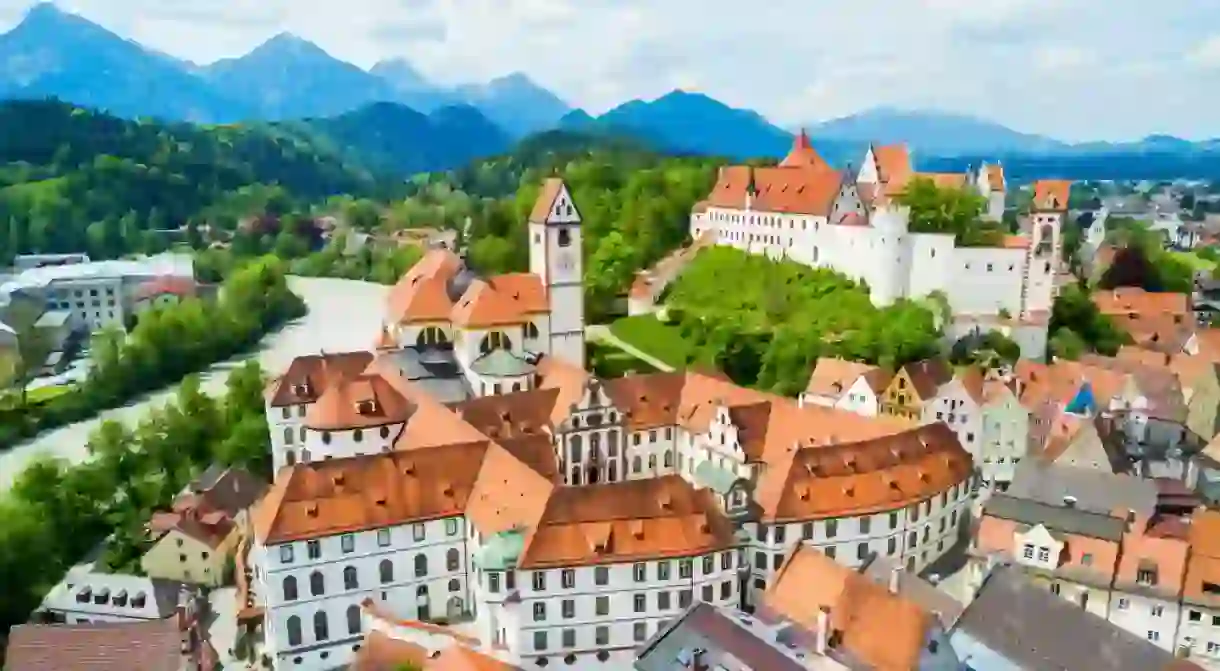Top 10 Things To See And Do In Füssen

Füssen is a tiny town in Bavaria, about a kilometre from the Austrian border, that has historically been a major centre for violin making. It takes about two hours to get here by train from Munich, and is a stop on most bus tours that take tourists to Neuschwanstein and Hohenschwangau castles. Whether you’re making a road trip pitstop between Munich and Innsbruck, or have some time to kill on a bus tour, here are 10 things you can do in Füssen.
Walk to Neuschwanstein and Hohenschwangau

The two most famous castles in Germany are just four kilometres away and can be reached on foot via a series of trails. There is a catch, however. Neuschwanstein and Hohenschwangau look as dramatic as they do because they are high up in the mountains. Füssen is not. The walk will take about an hour and will shred the knees and/or calves of unfit adventurers. Still, how cool is it to say you walked there?
Go to the violin and lute museum
Museum
Not everything in Füssen will send you hobbling straight to physiotherapy. The Museum der Stadt Füssen (the City of Füssen Museum) is all about the town’s history as a major centre for violin and lute making. All that spruce in the neighbouring forests makes beautifully resonant instruments, plus the town is on the trade routes to various musical cities in Italy and Austria.
St Mang's Abbey
Monastery
The home of the oldest fresco in Germany, dating to the year 980 (no we did not forget a 1), St Mang’s Abbey has been around for most of modern history. Originally founded by a hermit and his brother, the Benedictine monastery became one of the most powerful institutions in a politically and socially complex area before being deconsecrated by Napoleon in 1802.
Kalvarienberg
Church
Since Bavaria is extremely Catholic, most cities in Germany’s largest state have some sort of Way of the Cross. And since much of Bavaria is mountainous, many of these make convenient hiking paths with built-in places to sit down an have a rest. Built in the 19th century, the Füssen Kalvarienberg is exemplary in that, from the top of the mountain, you have a fantastic view over the whole town of Füssen, the Lech Valley, Swan Lake and the Neuschwanstein and Hohenschwangau castles.
Go mountain biking
Architectural Landmark

Füssen is surrounded by mountains, so it follows that there is plenty of opportunity for throwing yourself down the side of one on a bike. There are several places in town that rent mountain bikes and, good news for people in your party who aren’t in Tour de France shape, there are plenty of options available with a battery for ascent assist.
Lechfall
Park, Train Station
If you want to enjoy nature in a less intense way than mountain sports, try a gentle walk to the Lechfall, a stepped waterfall at a bottleneck in the chalk blue-green Lech river. The falls are 20 minutes walk through a park from Füssen train station. You could walk back into town after visiting the falls and have some coffee and cake, or you could cross the road and visit the town’s only steakhouse.
Visit the High Castle
Art Gallery, Building
Right next to St Mang’s Abbey, you’ll find the Hohes Schloß, or High Castle. These days, it’s home to the local tax office, the state art gallery, and a tower complete with dungeon. The interior of the castle is in good condition and offers a quick history of building styles from the 15th to 19th centuries. Look for the Gothic wooden ceilings in the Knight’s Room and take in the view of the Allgäu from the Veitskapelle, the highest castle chapel in Germany.
Grab a beer at Bierstube
Hotel

One of the best ways to get a feel for a new place is to head to a local bar and see what’s what. The Bierstube at Hotel Hirsch is a charming traditional Bavarian pub serving local food, draft beer from Munich and a lot of Füssen realness in the form of locals meeting up with friends for a meal and chatting the night away.
Walk to Austria
Park, Train Station
If you keep walking down the road past the Lechfall – so about 25 minutes from Füssen central station – you’ll very quickly find yourself in Austria. Also, in the forest and probably negotiating some sort of intense incline – this is the Alps after all. Keep an eye out for a sign or a marker in the forest showing the border.
Wieskirche
Church
The Wieskirche is not technically in Füssen, but then neither is Neuschwanstein. Ten minutes on a bus will get you to neighbouring Steingaden, where Dominikus Zimmermann and his brother Johann Baptist created what has become one of the world’s most famous Rococo masterpieces and a UNESCO world cultural heritage site and a monument to what can be accomplished when architects embrace the philosophy of “more is more.”













